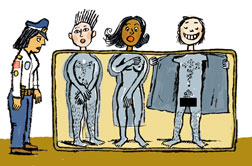Aletho | Like the Roman legions vanquished in the Teutoburger Wald in Lower Saxony in 9 AD, the 17,000 police officers that marched into the woods around the nuclear storage facility in Gorleben in northern Germany on Sunday morning looked invincible. Police personnel from France, Croatia and Poland had joined in the biggest security operation ever mounted against protestors against the a train carrying nuclear waste to a depot in an isolated part of Lower Saxony’s countryside. Helicopters, water canons and police vehicles, including an armoured surveillance truck, accompanied an endless column of anti-riot police mounted on horses and also marching down the railway tracks into the dense woods. Tens of thousands of anti riot police clattered along the tracks, their helmets and visors gleaming in the morning sun, and wearing body armour, leg guards and carrying batons.
But by Sunday night, those same police officers were begging the protestors for a respite.
Trapped in black, icy woods without supplies or reinforcements able to reach them because of blockades by a mobile fleet of farmer’s tractors, the exhausted and hungry police officers requested negotiations with the protestors. A water cannon truck was blocked by tractors, and yet the police still had to clear 5000 people lying on the railway track at Harlingen in pitch darkness. The largest ever police operation had descended into chaos and confusion in the autumn woods of Lower Saxony, defeated by the courage and determination of peaceful protestors who marched for miles through woods to find places to lie down on the tracks and to scoop out gravel to delay the progress of the “the train from hell.”
The police union head Reiner Wendt gave vent to the general frustration when he issued a press statement via the DPA news agency last night saying the police had reached exhaustion point and needed a break. Behind the scenes, a battle seemed to be raging between the police chiefs, tucked up in their warm headquarters urging more action, and the exhausted officers on the ground.
The police on the ground won out. The Castor train – called a “Chernobyl on wheels” because it has been carrying 133 tonnes of highly radioactive waste to an unsafe depot – was stopped in the middle of the countryside and Nato barbed wire was placed around it. Lit by floodlights and guarded by a handful of police, the most dangerous train on the planet was forced to a halt after a 63 hour journey across France and Germany.
The defeat of the legions at Teutoburg marked the end of the attempt by the Roman empire to conquer Germania magna. And the failure of the biggest ever police operation two thousand years later in the woods of Lower Saxony to tame women, elderly people and school children protesting the government’s nuclear policy, could well also go down as a turning point.
The Berlin government can no longer rely on the discredited mainstream media to control the way people see issues. Too many people recognise it to be a tool of propaganda. The government now needs to resort to brute force to bludgeon through decisions that enrich corporations and banks and impoverish everyone else. But the police forces at its disposal are simply not sufficient given the scale of the protests now gripping Germany. Only 1,500 police reinforcements could be mustered on Morning from the entire territory to deal with road blockades by thousands of protestors aiming to delay the transport of the nuclear waste on the final leg of its journey.












